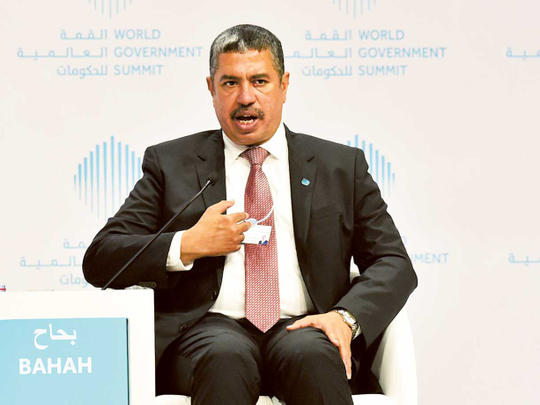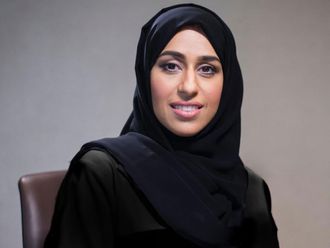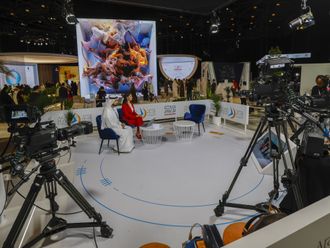
Dubai: The political process and military progress will continue in Yemen until peace is achieved, Dr Khalid Bahah, Vice-President and Prime Minister of Yemen, said at the World Government Summit in Dubai on Tuesday.
Hoping for peace in the near future, Bahah answered 10 questions about the challenges facing Yemen’s government in achieving development at a session titled ‘10 for 20 minutes’.
“The government is in control of over 80 per cent of Yemen and its lands. Our goal is to achieve peace before moving to liberating cities,” he said.
Referring to the military intervention by the Gulf States as “the last resort”, Bahah highlighted the continuous resistance by Al Houthi rebels to negotiate and reach a peaceful agreement between 2011-2013. He said despite efforts made by the United Nations and GCC Council in 2011, the rebel militia refused to be a part of the reconciliation process, making military intervention necessary.
“We have learnt from our history that we are able to intervene and resolve conflicts in Yemen by talking to different tribes. However, we are in a different time and this is a different case. The Iranian intervention is very clear.”
Referring to both Geneva peace talks as “attempts that failed before they started”, Bahah said the rebel militia’s resistance and attitude at the talks showed no interest in reserving the rights of the Yemeni people and no hope of reconciliation.
“The situation in Yemen is very difficult and exceptional, and it’s clear that the rebels are backed by outside forces. Iran’s strategy is for the war to continue and they are doing that by making decisions in the name of other parties in Yemen,” he said.
When asked when the city of Taiz will be liberated, Dr Bahah said a decision has been taken and all means available will be used to make Taiz a free city. “The city of Taiz is smaller than Aden but has a larger population. Its geographical nature and demography both make it harder to liberate than the city of Aden that lies on the coast — however it will happen soon,” he claimed.
Bahah also touched upon Yemen’s army, confirming that former president Ali Abdullah Saleh has had a role in dividing the military. “In the cases of Mukala and Hadramout, 20,000 military men were unable to fight 6,000 rebels, showing that they are followers of the former president,” he said.
Liberated cities in Yemen are also often attacked by the rebels soon after the government regains control of them, making the goal of achieving peace before restructuring even more important, added Bahah.
He noted that while the payroll shows that the national Yemeni army has an estimated 300,000 to 500,000 soldiers, there is a lack of unification and high levels of corruption.
“Now, soldiers receive 45 days of training before they enter the army. We are aware that this is not enough, but in this case it is due to the situation — after the war, we plan on fully training them at the academy,” noted Bahah.
Looking ahead, he said he has a vision to reconstruct the country, and called for regional and international cooperation to begin the redevelopment process. “Our focus now is to address the humanitarian situation in Yemen and work on security, education, and health care,” he said.
Sharing the belief that at times in order to achieve peace, war must take place, Bahah pointed out that a strategy has been put in place to help rebuild what has been officially identified as the poorest country on earth. “We have had lots of wars, but our country is alive and we will be able to create prosperity and be happy and productive again,” said Bahah.












